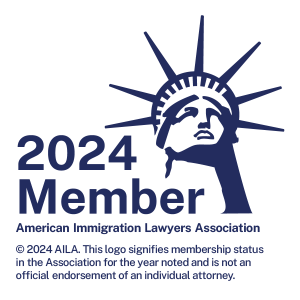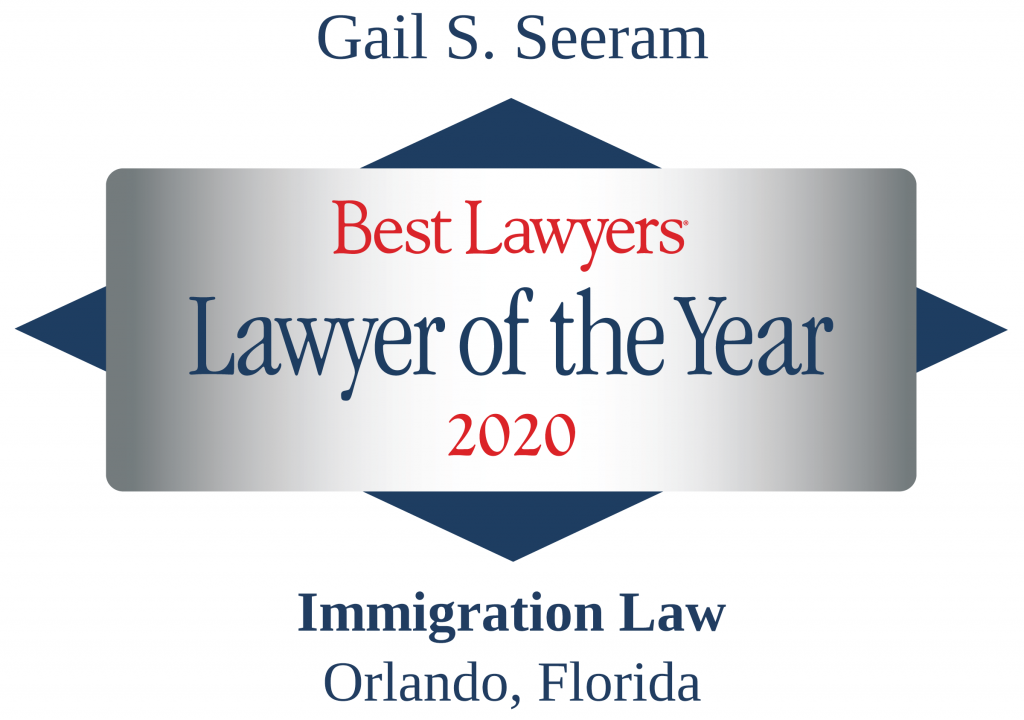
You attended your interview at the U.S. Embassy for your immigrant visa (or green card) to the United States. All the proper documents have been submitted and you completed your medical exam, police clearance, affidavit of support. You are very excited yet nervous. At the end of the interview, the officer gives you a paper that states you have been found “inadmissible” or ineligible for the immigrant visa and you may file a waiver. Confusion sets in and then you seek legal advice from Immigration Attorney Gail S. Seeram. As seen in the attached photo – we get approvals for our clients Waiver I-601.
First, we need to determine which ground of inadmissibility is being used against the applicant to deny issuance of the immigrant visa (green card). Individuals who are inadmissible are not permitted by law to enter or remain in the United States. The U.S. Immigration and Nationality Act sets forth grounds for inadmissibility. The general categories of inadmissibility include health, criminal activity, national security, public charge, lack of labor certification (if required), fraud and misrepresentation, prior removals, unlawful presence in the United States, and several miscellaneous categories (listed in detail at end of article).
Second, we file an Application for Waiver of Grounds of Inadmissibility (Form I-601) with supporting documents to prove “extreme hardship” to the U.S. citizen or Permanent Resident relatives.
Third and most frustration step the in the process – WAITING. It can take up to one year for U.S. Citizenship and Immigration Services to decide or adjudicate an application for a waiver I-601. If the waiver application is approved then the consular officer is informed and another appointment will be set at the U.S. Embassy for immigrant visa issuance. if the waiver application is denied, then you may consider an appeal or a motion to reopen or reconsider the decision (Form I-290B). Note, the entire waiver application process is more than filing Form I-601. There must be sufficient documentary evidence to prove the legal requirement of extreme hardship.
The phrase “extreme hardship” is not defined in the U.S. Immigration and Nationality Act. Ultimately, “extreme hardship” must be evaluated on a case-by-case basis after a review of all the circumstances in the case. Most common factors considered are (1) the age of the alien, both at the time of entry to the United States and at the time of application for suspension of deportation; (2) the age, number, and immigration status of the alien’s children an d their ability to speak the native language and adjust to life in another country; (3) the health condition of the alien or the alien’s child, spouse, or parent and the availability of any required medical treatment in the country to which the alien would be returned; (4) the alien’s ability to obtain employment in the country to which the alien would be returned; (5) the length of residence in the United States; (6) the existence of other family members who will be legally residing in the United States; ( 7) the financial impact of the alien’s departure; (8) the impact of a disruption of educational opportunities; (9) the psychological impact of the alien’s deportation or removal; (10) the current political and economic conditions in the country to which the alien would be returned; (11) family and other ties to the country to which the alien would be returned; (12) contributions to and ties to a community in the United States, including the degree of integration into society; (13) immigration history, inclu ding authorized residence in the United States; and (14) the availability of other means of adjusting to permanent resident status.
Grounds of Inadmissibility:
1. Inadmissibility Due to Health concerns covers a range of situations. In general, they
include those who have a communicable disease of public health significance, those seeking immigrant status who has failed to receive necessary vaccinations against vaccine-preventable diseases, those who have or have had a physical or mental disorder with associated harmful behavior or harmful behavior that is likely to reoccur. Harmful behavior is behavior that poses, or has posed a threat to person or property, and those who are drug abusers or addicts.
2. Inadmissibility due to criminal reasons include crimes involving “moral turpitude,”
violation of any controlled substance law, multiple criminal convictions, drug trafficking, prostitution, commercialized vice, commission of a serious crime in the United States where a person has asserted immunity from prosecution, violations of Religious Freedom, human trafficking, money laundering.
3. Inadmissibility due to national security reasons include any person who a Department of State consular officer, DHS immigration officer, or DOJ immigration judge, knows or has reasonable ground to believe that the non-citizen seeks to enter the United States to engage in espionage or sabotage, to attempt to overthrow the U.S. government, has reasonable ground to believe that the non-citizen has participated in any terrorist activities or has any association with terrorist organizations, has reasonable ground to believe that the person presents a threat to foreign policy or has membership in any totalitarian party or has participated in Nazi persecutions or genocide is inadmissible.
4. Public Charge pertains to a person being inadmissible if he or she is likely to be primarily dependent on the government for subsistence.
5. Inadmissibility due to lack of labor certification: This ground makes certain aliens who seek to enter permanently (as immigrants) into the United States and to work inadmissible unless the Secretary of Labor certifies that employment of the person will not adversely affect the wages and working conditions of U.S. workers similarly employed; and there are not enough U.S. workers willing, qualified, and able to do the same work.
6. Inadmissibility due to fraud or misrepresentation relates to any person who sought admission to the United States, a visa or other immigration travel or entry document, or any immigration benefit by fraud or willfully misrepresenting a material fact is inadmissible.
7. Inadmissibility due to prior removals or unlawful presence will bar any person from returning to the United States because they have been in the United States for a period in excess of 180 days, during a single stay, and then departed the United States. Also, individuals who are barred from returning to the United States because they had either been removed (or excluded or deported) from the United States or departed the United States on their own volition while a final order of removal was outstanding. Individuals who were unlawfully in the United States for a total of one year (whether accrued during a single stay or multiple stays) AND then, illegally (without being inspected and admitted or inspected and paroled) reentered the United States.
8. Miscellaneous grounds of inadmissibility include persons who entered the country illegally (without being inspected and admitted or paroled), persons who failed to attend immigration and/or removal hearings, smugglers, student visa abusers, former U.S. citizens who renounced citizenship to avoid taxation, practicing polygamists, unlawful voters, and international child abductors and relatives of such abductors.
For more information on Waiver I-601,
text | whatsapp | call 407-292-7730 or email [email protected]
FREE phone & in-office consultation – FREE Live Chat www.GailLaw.com
Copyright © 2018, Law Offices of Gail S. Seeram. All Rights Reserved.













